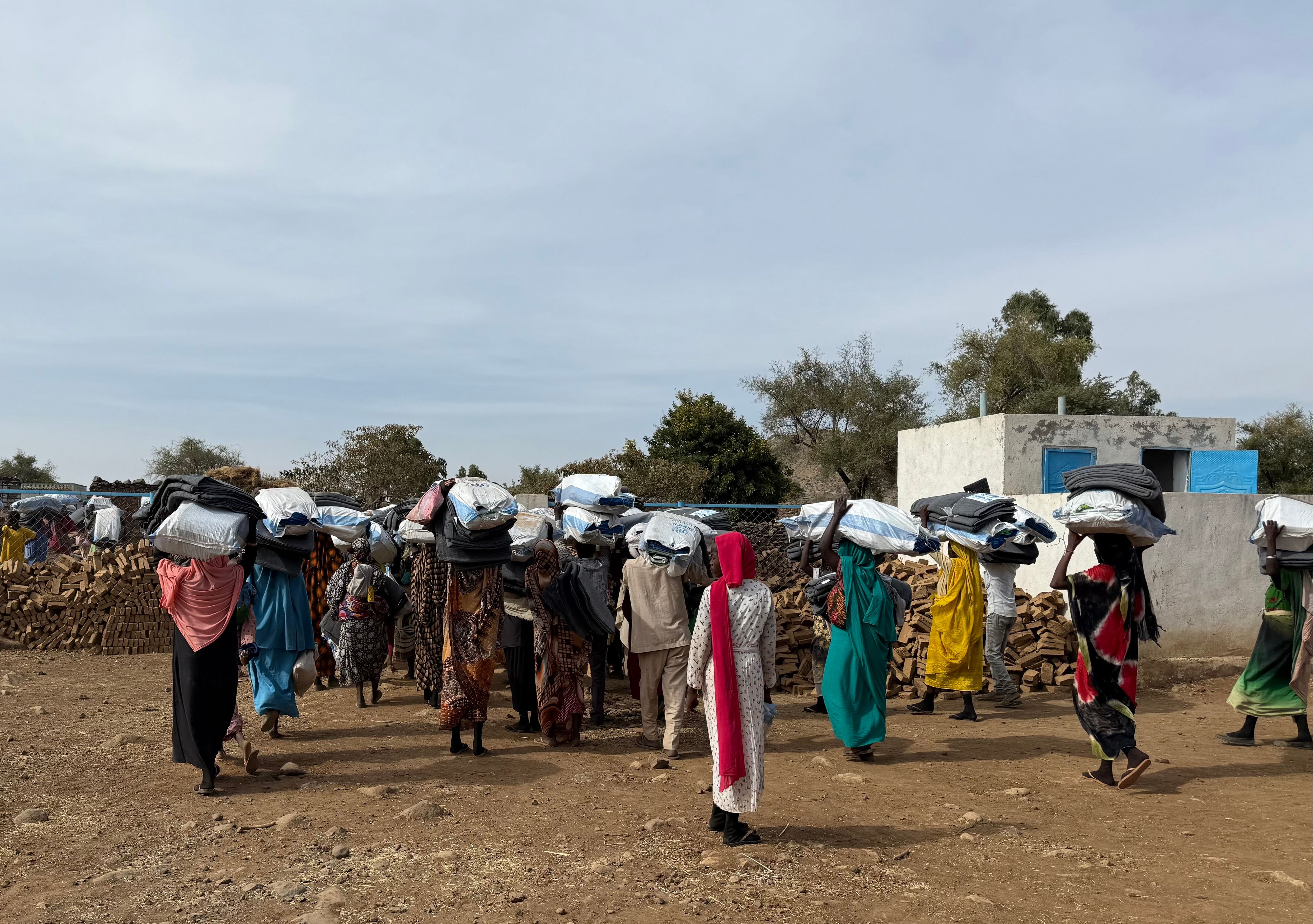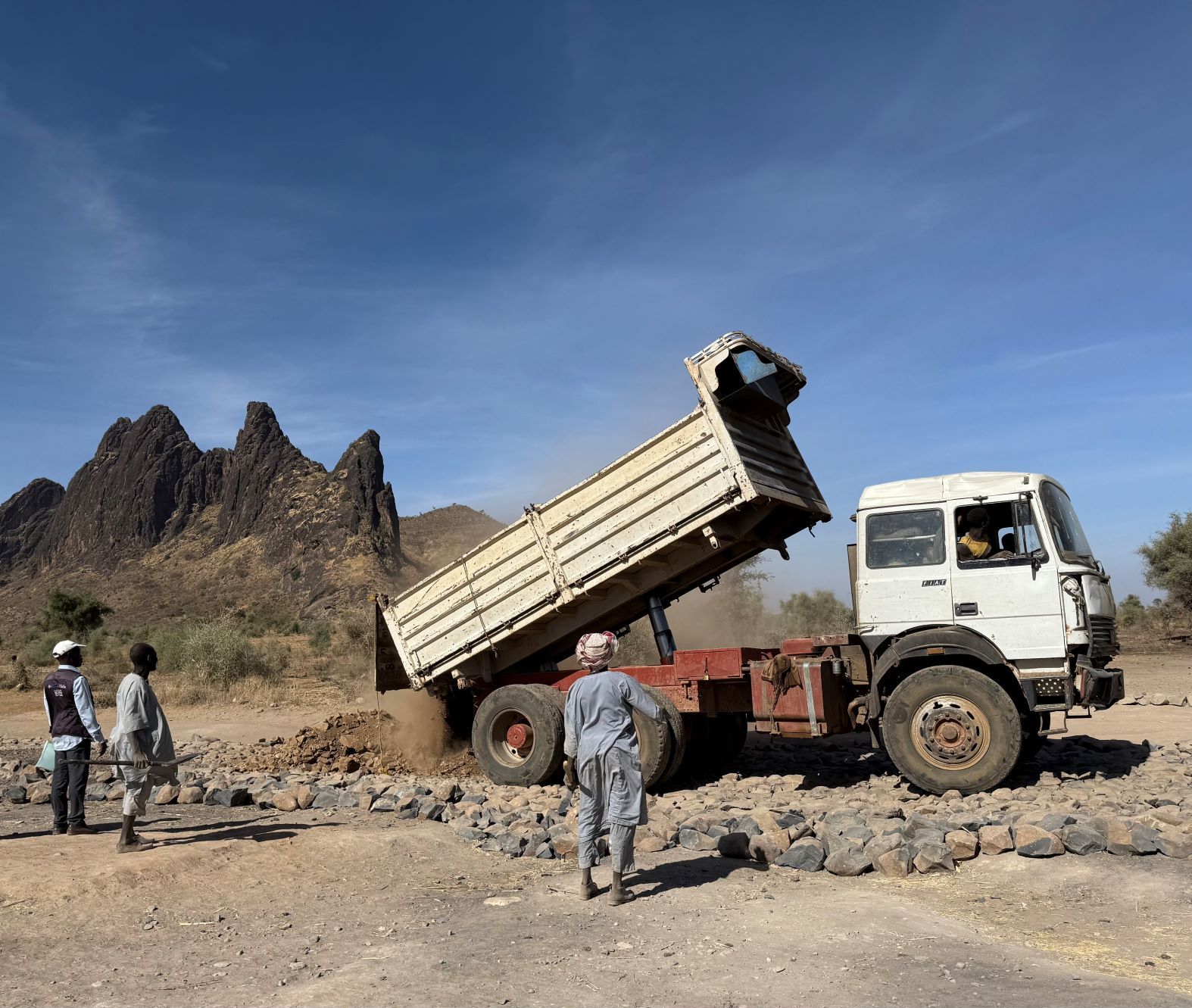Two years after the Sudan crisis started, Swiss support is more crucial than ever
Two years after the war broke out, fighting continues in Sudan, forcing the population into a dire humanitarian crisis. Since the beginning of the conflict, Switzerland has allocated CHF 128 million to support Sudan and the neighbouring countries of Chad, South Sudan and Egypt. Switzerland works towards ensuring respect for international humanitarian law and achieving a ceasefire. On 15 April 2025, a Swiss delegation took part in a ministerial conference in London on the situation in Sudan.

In 2025, the situation in Sudan is alarming. As clashes between the Sudanese Armed Forces (SAF) and the Rapid Support Forces (RSF) continue since April 2023, the population is facing an unprecedented humanitarian crisis. Famine and cholera continue to spread, causing thousands of deaths. More than half of the population is suffering from acute food insecurity – around 24.6 millions people - and around 30 million people are now in need of humanitarian assistance, according to the United Nations. Women, children, and marginalized groups are exposed to serious violations of international humanitarian law, particularly large-scale sexual violence. The conflict has also triggered massive displacement: 11.3 million people have been displaced within the country, and 3.9 million have fled to neighboring countries, notably Chad, South Sudan, and Egypt.
Ministerial Sudan Conference in London, 15.4.2025
A delegation led by SDC Director-General Patricia Danzi, and consisting of the Swiss Special Representative for the Horn of Africa, Sylvain Astier, and the Deputy Head of the Peace and Human Rights Division at the FDFA, Sybille Obrist, took part in the Sudan Conference in London on 15 April 2025. The ministerial meeting provided a platform for discussing the conflict in Sudan and its devastating humanitarian consequences. The aim of the conference was to mobilise international attention and support, develop a common international position on conflict resolution and identify concrete steps for better humanitarian access and more effective aid.

A cross-border crisis
The crisis has also spread beyond Sudan's borders to neighbouring countries - Chad, Egypt and South Sudan - which are facing an influx of refugees, putting enormous pressure on already fragile infrastructures. During a visit to South Sudan in January 2025, SDC Director General Patricia Danzi, stated: “ The ongoing war in Sudan is worsening the situation for host populations in northern South Sudan and in neighbouring countries. It is having a devastating impact on the economy as well as inflation levels. Contributing to efforts to resolve this conflict and restore peace is essential.”
While the humanitarian challenges are formidable, the road to a political transition remains complex. The country appears to be dividing into two distinct governments. On 5 March 2025, the Rapid Support Forces and allied parties signed the ‘Nairobi Charter’ and declared a parallel government and a new constitution. For their part, the Sudanese Armed Forces have begun to set up a civilian government.
Switzerland mobilizes funds und expertise
Switzerland is closely monitoring the humanitarian situation in Sudan and its repercussions in neighbouring countries. Since November 2024, the operational activities of the Swiss Agency for Development and Cooperation (SDC) have been coordinated from the Swiss embassy in Cairo. For Kathrin Wyss, head of international cooperation for Sudan, being based in Cairo means she can travel more easily to Sudan and to follow more closely the activities supported by Switzerland, in order to react more swiftly to developments on the ground.
During her last mission there in December 2024, Kathrin Wyss visited Kassala, in the east of the country, where many internally displaced persons and refugees from Eritrea and Ethiopia are seeking refuge. “Beyond emergency aid,” she stresses, “there are ways in which longer-term approaches can help people build and secure their own existence. Such opportunities also exist in places where they are least expected, such as Darfur”. She also describes how the partners are working with the local population, for example, in the construction and maintenance of roads to facilitate access to markets.

She points out that “in Egypt too, the conflict in Sudan is very present, even before the war began. The new SDC office in Cairo can draw on the expertise of colleagues in the Egyptian team who have been working on migration issues for a long time. At the same time, it is important to maintain contact with the humanitarian hub for Sudan in Nairobi, Kenya, as well as with numerous key partners for the SDC, including two FDFA staff members who work on Sudan. There is still a lot to be done: two new programme managers have just taken up their posts, with their offices still being fitted out.”
In its response to this crisis, Switzerland is adopting a regional approach and involving all the relevant units of the FDFA at headquarters and in the field. To date, it has contributed a total of CHF 128 million in support for Sudan and the neighbouring countries. These funds are divided between United Nations agencies, the ICRC and international NGOs. The total amount includes the CHF 24 million that Switzerland will provide in 2025, of which CHF 17 million will be allocated to Sudan and CHF 7 million to Chad, South Sudan, and Egypt. Switzerland has also provided a number of organisations (OCHA, UNHCR, WHO, IOM, WFP, Médecins Sans Frontières and Mercy Corps) with experts from the Swiss Humanitarian Aid Unit specialising in water, sanitation and hygiene, protection and health to support the work of these organisations in the field.
A diplomatic commitment to peace
On the diplomatic front, Switzerland calls for respect for international humanitarian law and protection of civilians, rapid and unimpeded humanitarian access to conflict zones, and a ceasefire. In July 2024, Switzerland hosted US-mediated ceasefire negotiations in Geneva between the Sudanese Armed Forces and the Rapid Support Forces. “Switzerland has provided a platform and is continuing its efforts to bring the parties back to the negotiating table,” said Patricia Danzi upon returning from her visit to South Sudan in January 2025. This commitment was reaffirmed at the meeting on Sudan hosted by the EU on 13 March 2025 in Brussels.
Sudan: A priority of Swiss peace policy
Since July 2023, Switzerland has been hosting confidential dialogues between the civilian parties in Sudan as part of its good offices in order to improve the chances of success of official negotiations on the political future of Sudan after the war. At the initiative of the United States, the FDFA also hosted a peace conference in Switzerland in August 2024. However, the non-appearance of one of the parties to the conflict at the time made it impossible to hold ceasefire talks. The conference therefore focused on humanitarian access and the protection of the civilians caught up in the war. These talks led to the formation of a diplomatic coalition known as ALPS (Aligned for Advancing Life-Saving and Peace in Sudan), which includes the United States, Switzerland, the United Arab Emirates, the Kingdom of Saudi Arabia, Egypt, the United Nations and the African Union. Through its joint diplomatic efforts, the ALPS group has since been able to obtain concrete commitments from the parties to the conflict. These include opening border crossings for the transport of humanitarian aid from Chad, allowing humanitarian flights, and the introduction of stricter rules for the protection of the civilian population by the Rapid Support Forces. Switzerland continues to work within the framework of the ALPS group to advance the implementation of these commitments on the ground.
In addition, the Swiss Special Envoy for the Horn of Africa has been advocating for a solution to the Sudan crisis. Through frequent contacts and public relations work in the region, he has built up a broad network for Switzerland. Furthermore, in September 2024 the FDFA's Peace and Human Rights Division (PHRD) deployed a human security advisor for Sudan to the region. This deployment will enable the PHRD to pursue a broader engagement in peace policy. This complements Switzerland's good offices and humanitarian diplomacy within the framework of the ALPS group.
Contact
Eichenweg 5
3003 Bern

